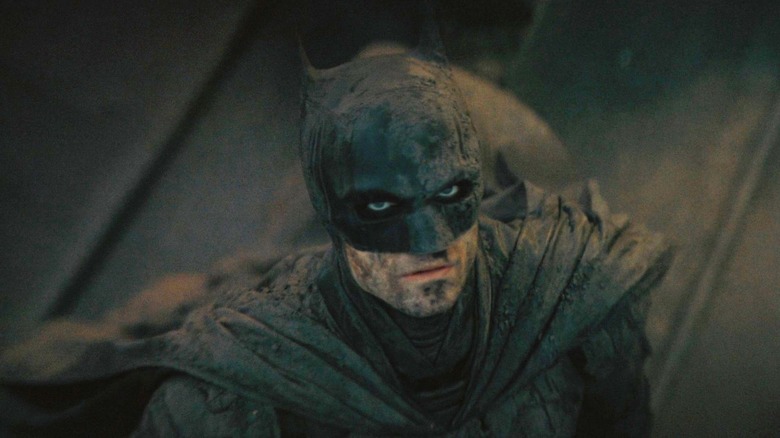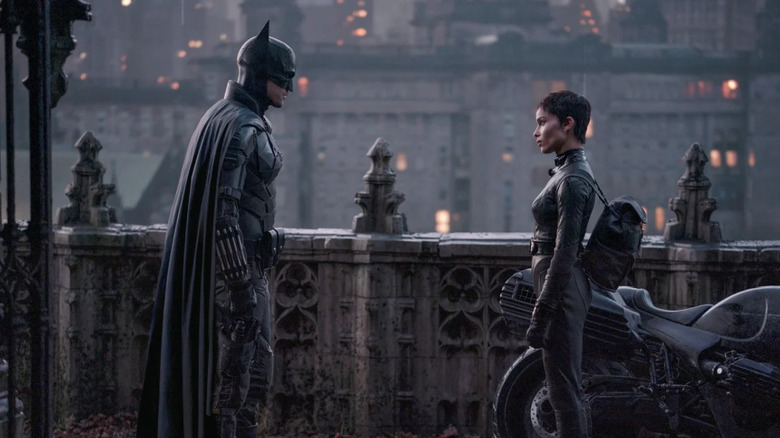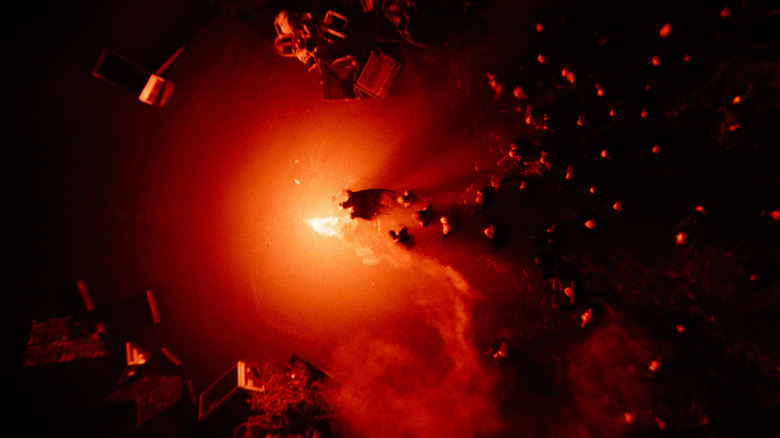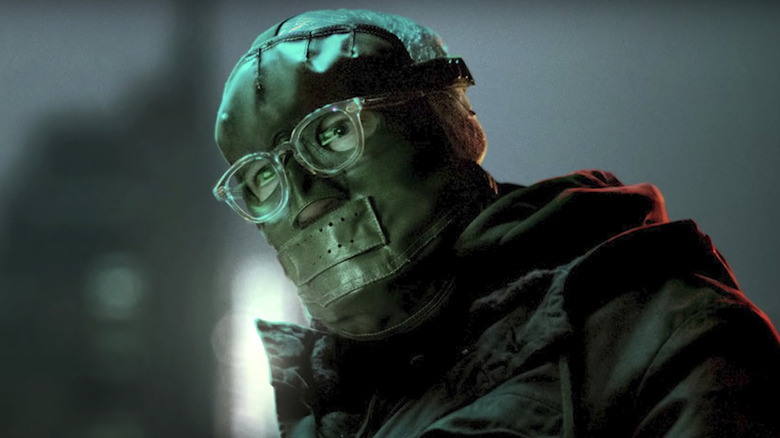How Composer Michael Giacchino Made The Batman Score Personal [Exclusive Interview]
When scoring a movie, composer Michael Giacchino always asks himself, "How I would feel in this moment?" It's a question that led to introspective, somber, and often thundering music in Matt Reeves' "The Batman." All scores are inherently personal to Giacchino, of course, but even when he scores a man in a cape chasing a mobster called the Penguin, he puts himself in the characters' shoes.
"The Werewolf By Night" director has repeatedly collaborated with "The Batman" director, Matt Reeves. On their two "Planet of the Apes" films, they also created atmospheres driven more by internal conflict than set-pieces. With "The Batman," the score struck a nice balance between the quiet and the operatic.
When we talked to the composer about his Marvel special, we couldn't help but ask a few questions about his experience on the DC Comics film, and how his score came to be.
'He's desecrating the good name of Batman by doing this.'
There's a track title on the soundtrack called "Meow and You and Everyone We Know." How'd a Miranda July reference end up in "The Batman" score?
All of those titles are, it's always a contest between me, the music editor, and even my assistant Curtis has been getting in on the game recently as well. Everyone sort of fights for who can come up with the best one for those things. It's just a game we all play and at some point, you have to make the cue sheet and it's got to come down to that.
When we're first watching the film, all of these ideas come up, and it's so funny. And Paul Apelgren, who was the music editor on that, came up with a bunch of them. Curtis had some on there too. But yeah, it's always just fun, it's just a way to distract ourselves when there's so much pressure to get this stuff done. We never forget to have fun as well.
Those things seem to be very divisive. There are some soundtrack lovers who are just like, "I can't believe he does this. He's desecrating the good name of Batman by doing this." And you're just like, I don't know about that. I mean, I get it, even on "Star Wars," it was different. For "Rogue One," I knew let's do a legit track list but include on the inside of the cover our own alternate track titles. So if anyone's a fan of those things, they can just change their things on iTunes or whatever they want to do. Change the titles for them.
Did Nirvana's "Something in the Way" help set a tone for you?
This is really embarrassing, but I did not know that song. I did not know that song at all. I feel like an old man saying that I did not know. Of course, now I know it. At the time when I was writing, I had no idea. I didn't know. It was eternal luck that those two were able to, in some way with a little tweaking, live together for the trailers the way they did them. It worked out really nicely.
It wasn't something that was planned ahead of time, it was just sort of, I wrote that theme after talking with [director Matt Reeves] for so long about the script and talking about the characters and all of that. The theme was written, I don't know, two years before the movie was even finished. Matt had that theme before they officially cast Robert Pattinson. I mean, that was crazy to have it that early. It's rare that happens. It all worked out. It was just serendipity. The main Batman theme that is just that dun dun dun, in certain ways they kind of just live together so nicely.
'He's meant to be a light for these people as opposed to something that hides in the shadows'
So you have that theme, the dun dun dun, but in the end when Batman realizes he actually wants to help people, not just beat them up, how'd you want to express that change musically?
Yeah, there's moments where you can kind of hear that change when he lights that flare at the end, when he realizes that he's meant to be a light for these people as opposed to something that hides in the shadows. What if we made a very poignant version of that theme? It just seemed to work really well. Suddenly it felt, because this was something you've been hearing for the past couple of hours and now to hear it in this way, it's just suddenly much more emotional.
I always looked at that scene and I found it so emotional when he's leading those people out of there and the light is going and you see all of that. I love movies that choke you up. I love it when you get emotional watching, even in a superhero movie, you can do it.
Matt Reeves is such a master at character and getting into what is important in what these people are, who they are, what they believe in, what their faults are, all of those things. They are so human, his characters are so human. When you watch the "Apes" movies, there are moments you want to cry in those movies too. He's crafting real people for you. They just happen to be an ape or happen to be wearing this bat suit. So it's really an incredible gift that Matt has, so he allows me to bring in the emotion.
I'm always like, "Matt, this is going to make me cry." And he's like, "Great, good. I want that. Make us cry." Well, it's happening. The music reflects how I feel about something when I'm working on it. Music works best when it's truthful to what is happening as opposed to, oh, this is a scary scene. All right, scary music. You know, I have to think about why this is scary? What is creating this mood in this person? How would I feel if I were them? I always want to put the music in that place of how I would feel if I were them at that moment.
'At the end of that movie, the Riddler is still a little lost in terms of who he is'
That movie was very much about people who have no idea who they are yet, so is that why you saved, for example, the full-on Catwoman and Riddler themes for the end?
Yeah, no, they each have a theme that slowly builds into something much bigger than themselves. The Riddler's theme goes nuts when he starts blowing up all of those things. I still believe at the end of that movie, the Riddler is still a little lost in terms of who he is. But there was that brief moment where he thought he knew who he was when he's seeing the city blow up and go to pieces around him. But in the end realizing, oh s***, I didn't pull it off. I didn't do it and it didn't work, but he finds another friend there in the end as well.
For Batman it was a slow progression, and that's what you want with all these movies. You don't want to just tell the punchline right up front, you want to make sure that there's an arc to it. It's going on a roller coaster. If the whole thing were downward, it's not as fun as going up and down and around and over. And that's what movies do best is take you on this ride, but you have to make sure it's built in the right way, that the ascension is right.
It still surprises me how he got to pace that movie.
Yes. I love that about Matt. I love that he's willing to take those moments and really let you live in them. I think that's great. We tried to do that wherever we could in "Werewolf by Night" as well. Even if you just do it a little bit, it means so much to the audience, you have to draw them in, in order to then surprise them. So when you're talking to somebody about an emotional moment, you're not going to yell at each other about it. You're going to talk in low tones and you're going to get closer to that person. I think that's what those moments are about is bringing the audience in closer. Sometimes it's emotional and sometimes it's scary, but it's always about being intimate as much as you can.



